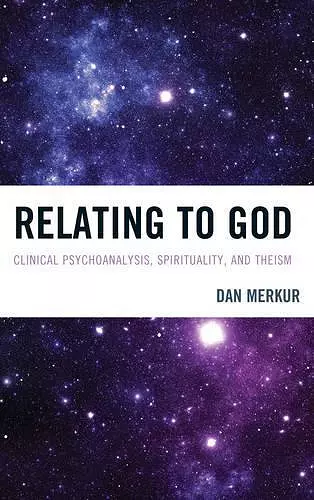Relating to God
Clinical Psychoanalysis, Spirituality, and Theism
Format:Hardback
Publisher:Jason Aronson Inc. Publishers
Published:21st Nov '13
Currently unavailable, currently targeted to be due back around 29th April 2025, but could change

In Relating to God: Clinical Psychoanalysis, Spirituality, and Theism, Dan Merkur conceptualizes religious discourse within psychoanalysis. He proposes that God be treated as a transferential figure whose analysis leads to a reduction of the parental content that is projected onto God. Merkur notes that religious conversion experiences regularly involve theological intuitions that are either rational or, owing to morbid complications, have undergone displacement into irrational symbolism. Analysis renders the religiosity more wholesome. Traditionally, psychoanalytic thought has been dismissive of religion. Freud is on record, however, as having called psychoanalysis a neutral procedure. He argued that religion, with its dependency on a providential God who punishes disobedience, imagines spirituality on the model of human parents and fails to approach spirituality in an appropriately scientific manner. He wrote little of spiritual phenomena, but mentioned both the rationality of the universe and the parapsychological occurrence of thought transference. Occasionally, later psychoanalysts used different language in order to contrast wholesome and morbid forms of religion. Erich Fromm distinguished authoritarian and humanistic religions, while D. W. Winnicott condemned fetishistic behavior while approving of playful illusions that require “belief-in.” These formulations constructed a middle position for clinicians, neither categorically opposed to religion as classical psychoanalysis was, nor do they embrace cultural relativity as “spiritually oriented” psychotherapists are currently advocating. What sorts of spiritual practices does psychoanalysis find unobjectionable? As examples of humanistic religion, Fromm named Zen Buddhism, Buddhist mindfulness meditation, and the via negativa or “way of negating” that some Christian and Jewish mystics have followed. Because the Bible-based approaches are little known, Merkur discusses their histories, procedures, and psychoanalytic understanding.
Dan Merkur, a practicing psychoanalyst in Toronto, has become one of the most important thinkers and prolific writers in the area of psychology and religion. While academic psychology of religion is increasingly preoccupied with cognitive neuroscience and brain studies, Merkur has steadfastly pursued his own path, which concentrates on sources in anthropology, ecstatic experiences, and the history of religions. This book, his latest of more than a dozen, is a worthy extension of his erudite interests, amounting to what Merkur understands as a ‘psychoanalysis of religion.’. . .This is the third book by Dan Merkur I have read closely, and I find his work to be very impressive. His reading of others is balanced and fair, he never ignores sources that disagree with his judgments, and his work in general is a significant contribution to the field. * RELIGION *
With a background in both the history of religions and in clinical psychoanalysis, Dan Merkur provides a thoughtful and thorough survey of a century of psychoanalytic thinking about religion and spirituality. His discussions of prayer, mysticism, the numinous, contemplative practice, and the image of God culminate in a thoughtful reflection on the therapeutic relationship as a Buberian ‘I-Thou’ encounter in which trust, meaning, and faith can emerge. Designed primarily for clinicians, the volume will also interest scholars of religion. -- Diane Jonte-Pace, Santa Clara University
Dan Merkur is one of those increasingly rare scholars who can insightfully and authoritatively relate the history of religions to the different schools of psychoanalysis, and vice versa. The present volume is a classic Merkurian performance, ranging from the Prophet Dance of the Beaver Indians of Canada and Freudian discussions of animism and cultural evolution, through the later ego and object relations psychologists and the Anglo-american conversion experience, to Bion’s mysterious O and the ‘negative way’ of Buddhist, Christian and Jewish mystical literature. A very impressive volume witnessing once again to the historical fact that robust comparativism never went away, nor should it. -- Jeffrey J. Kripal, PhD, Roads of Excess, Palaces of Wisdom: Eroticism and Reflexivity in the Study of Mysticism
ISBN: 9780765710154
Dimensions: 232mm x 160mm x 29mm
Weight: 599g
318 pages